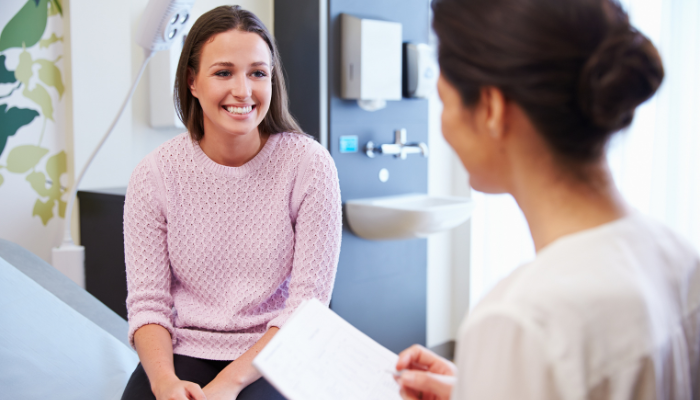Don’t be Among the Many Mothers Who Silently Suffer from Uterine Fibroid Pain
By TMoM Team Member Suzy Fielders
Motherhood is hard enough juggling everything, but if you have chronic pain from uterine fibroids then some days feel like a true struggle. You don’t have to keep suffering. Are you suffering from heavy or irregular bleeding or intense pelvic pain during your menstrual cycle? There’s a chance you might have uterine fibroids. Did you know that half of women will have fibroids by the age of 50? That shocking number alone is reason enough to speak with your gynecologist if you have any symptoms (learn more in the blog below).

Atrium Health Wake Forest Baptist offers an expert and caring team of professionals who specialize in uterine fibroids. From their minimally invasive gynecologic surgery program to various treatment plans, they aim to partner with you to provide relief from the constant pain. You don’t have to continually live in pain. Visit WakeHealth.edu/MIGS or call 336-716-6476 to schedule your appointment today to get the help you need.
Dr. Janelle Katie Moulder is a fellowship trained gynecologic surgeon at Atrium Health Wake Forest Baptist. She specializes in a variety of areas of gynecology and reproductive surgery, including uterine fibroids, chronic pelvic pain, and minimally invasive gynecologic surgery. “Managing complex pain conditions is challenging but incredibly rewarding,” she says.

In the Q&A session below, Dr. Moulder shares more on her background and uterine fibroids. Meet Dr. Moulder
What led you to become a doctor? “I had surgery as a young child, which likely sparked both a curiosity in medicine and a desire to care for others.”
How did you determine chronic pelvic pain was your niche? “I would say that pelvic pain found me! I was a neuroscience major as an undergraduate and found my way to gynecology as a specialty in medical school. It wasn’t until I chose a fellowship in minimally invasive gynecologic surgery that I realized how many of our decisions in medicine are influenced by trying to treat pain (either medically or surgically).”
Uterine Fibroids While the exact cause of uterine fibroids is unknown, many medical professionals think they are caused by hormones and/or genes. They vary in size from microscopic to larger dimensions. Uterine fibroids can grow anywhere in the uterus from the muscle wall of the uterus (myometrial) to the outside lining of the uterus (subserosal).
What are the symptoms of uterine fibroids? How can a woman tell the difference between normal menstrual symptoms and ones for uterine fibroids?
“Common symptoms for fibroids include heavy bleeding or irregular bleeding, pelvic pressure, or cramping pain with periods (in this case, secondary dysmenorrhea due to fibroids). If you experience a change in the quantity of bleeding (i.e. is it heavier now), or frequency (i.e. bleeding pattern has changed, no longer predictable), or your periods have become more painful than they once were, this should be evaluated by your doctor. They will likely start with taking a thorough menstrual history (what was your typical pattern/cycle like, and how has it changed), an examination, which may include a pelvic exam, and potentially a pelvic ultrasound.”
Since a potential cause is hormones in the body, does that mean pregnancy and labor/delivery increase chances of getting fibroids due to all the increase and fluctuations of hormones?
“Fibroids are incredibly common. The exact cause of fibroids in some women, and not others, is not yet known, but a lot of research is focused on this. Most women who are pregnant and have fibroids do not have any issues or complications. Others, however, may experience pain due to their fibroids. Fibroids may increase in size during pregnancy but can regress postpartum.”
How does the MIGS practice at Atrium Health Wake Forest Baptist assess and diagnose fibroids?
“Listening to patients describe their experience can often highlight changes that raise your suspicion for fibroids. In our practice, imaging studies, like ultrasound or MRI are incredibly helpful for identifying fibroids, and helping to map their location, especially in patients undergoing surgery. In partnership with our colleagues in radiology, we have a specific protocol for patients undergoing MRI for fibroid mapping that allows us to determine best surgical approach, and to determine whether a patient may be a candidate for an interventional approach, such as embolization or radiofrequency ablation.”
How do you collaborate with radiologists to provide the best possible care and assessments of imaging needed for patients?
“With our fibroid care collaborative, we work closely with diagnostic radiologists (the physicians interpreting imaging studies and designing protocols) and interventional radiologists (the physicians offering procedures, such as embolization, that may target a fibroid for symptom improvement) to review images in the context of the patient’s symptoms and their goals for treatment. Not every patient may respond to medical management, nor will every patient be a good candidate for an intervention or surgery. With close communication and imaging review, we work to provide our patients the highest quality, evidence-based care, that aligns with their treatment goals.”
How do the providers work with patients to determine the best course of treatment for fibroids?
“Listening to your patient, to identify both the symptoms that bother them and what their individual goals are for treatment helps determine the best course of treatment. Some patients will want symptom improvement (e.g. a reduction in bleeding), without undergoing major surgery. Others want a procedure that will maintain fertility (or the option for future fertility). Still others want a procedure that is more definitive. There are many fibroid treatment options available now; for many patients, it is simply a matter of identifying goals for treatment and understanding what a particular procedure will be able to accomplish.”

Atrium Health Wake Forest Baptist is Here for You from Diagnosis to Treatment of Uterine Fibroids
Do you have uterine fibroids and want pain relief? Or have you been to an assortment of doctors with no diagnosis for your chronic pelvic pain or extreme menstrual symptoms? The team at Atrium Health Wake Forest Baptist is here to help you. Don’t live in pain any longer or feel like no one is listening to your concerns. Visit WakeHealth.edu/MIGS or call 336-716-6476 to schedule an appointment or learn more about pain relief and treatment for uterine fibroids.

*Sponsored by Atrium Health Wake Forest Baptist
